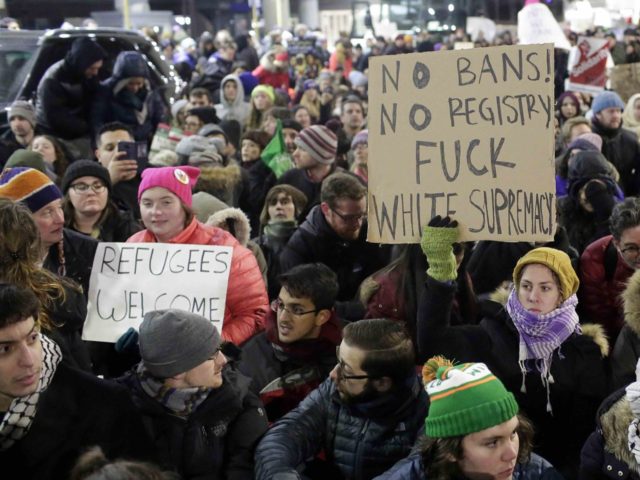The number of refugees admitted into the country during the first month of FY 2018 by the Trump administration plummeted to 1,242 – an 87 percent decline from the 9,945 admitted during the first month of FY 2017 by the Obama administration.
The percentage of refugees admitted who are Muslim declined dramatically as well, from 45 percent in October 2016 to 23 percent in October 2017, according to the State Department interactive website.
Of particular note is the precipitous drop in the number of refugees admitted from the seven countries whose citizens were temporarily banned from traveling to the United States under the first travel ban, Executive Order 13679, issued by President Trump on January 27, 2017.
In October 2017, the first month of FY 2018, only 275 refugees from these seven countries — Iran, Iraq, Libya, Somalia, Sudian, Syria, and Yemen — were admitted to the United States under the Refugee Admissions Program.
In contrast, in October 2016, the first month of FY 2017, a total of 4,581 refugees from these seven countries were admitted into the United States under the Refugee Admissions Program (1,352 from Somalia, 1,323 from Iraq, 1,297 from Syria, 414 from Iran, and none from either Libya or Yemen.)
Should refugee admissions continue at this same pace for the remaining eleven months of FY 2018, the total number of refugees admitted for the entire fiscal year would be less than 15,000, which is 30,000 below the 45,000 cap for refugees set forward in the Trump administration’s presidential determination announced in September.
While such a dramatic dropoff seems unlikely, it is not outside the range of the possible.
The Refugee Act of 1980 requires the announcement of a presidential determination for the ceiling number of new refugee arrivals in the next fiscal year before the end of the previous fiscal year, but that number simply states the top cap for potential refugee arrivals.
The funding for the number of new refugee arrivals below that cap is determined by Congress, in consultation with the administration, during the budgeting process for the fiscal year. The announcement of a ceiling number of potential refugees in the presidential determination does not mean that that the ceiling number will be reached during that fiscal year, though historically the number of refugees admitted usually approaches or reaches the ceiling number.
FY 2018 is likely to be different than any preceding year in the three-decades-plus history of the federal refugee resettlement program, as a series of more stringent vetting procedures for potential refugees developed by the Trump administration’s Department of Homeland Security are currently in the process of being implemented.
Those vetting procedures may serve as an effective bottleneck to slow the flow of refugees into the United States at a level significantly below the announced refugee ceiling of 45,000 for FY 2018.
Refugee Council USA, the “trade organization” of the refugee resettlement industry, issued a statement last week that it “is appalled by the Administration’s proposed changes to refugee processing. These changes enact another ban on refugee admissions and are driven by ideology rather than necessity.”
The Trump administration, however, is continuing with its improved refugee vetting processes.
The refugee resettlement industry — which receives almost all of its estimated $1 billion annual funding from the federal government — is already feeling the budget pinch resulting from the diminished number of new arrivals.
“Refugee advocates called attention to the low monthly numbers in an online campaign Monday,” Voice of America reported, linking to this tweet from the Refugee Council USA:
FACT: 3,750 refugees must be admitted per month to meet to meet @POTUS‘s low 45k goal. Only 1,241 were admitted in Oct. #WhereRTheRefugees
— Refugee Council USA (@RCUSA_DC) October 30, 2017
The harsh political reality now facing the refugee resettlement industry is that neither the Trump administration nor Congress have much inclination to meet that 45,000 annual refugee ceiling.
This is especially the case in light of the recent revelation, reported by Breitbart News, that the Refugee Council USA spent $100,000 this year to hire the Podesta Group to lobby Congress and provide pro-Amnesty Republican legislators with “talking points” that can provide them “cover” when talking about refugee resettlement issues with the media and other Republicans.

COMMENTS
Please let us know if you're having issues with commenting.